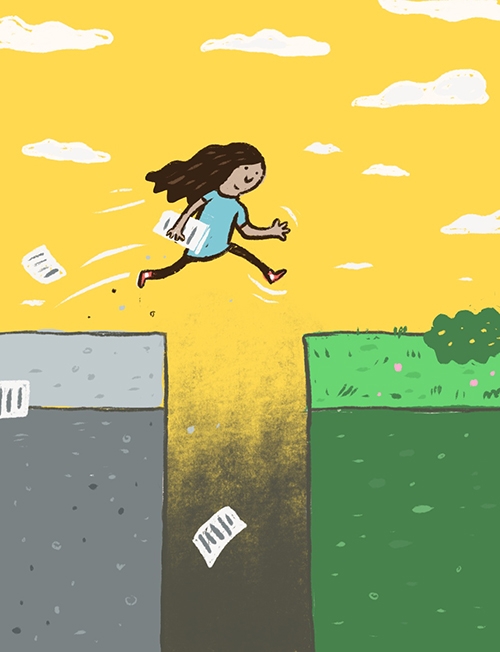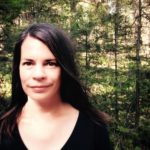I have tended to live my life as if there are guarantees: as if writing will wait patiently for me until I am ready to do it, or have time and energy to focus, or feel mentally well enough to devote myself. But after the 2016 presidential election, all that changed. I was walking to work listening to Hillary Clinton’s concession speech. I was crying. I felt an overwhelming sense of uncertainty, and I realized that any security I had ever felt was both a privilege and an illusion. None of my assumptions about having endless, expansive time to accomplish my writing goals felt true anymore, and so I made a decision right there on the pedestrian overpass that straddled the tracks: I decided I had to stop messing around, stop letting depression and anxiety hinder and inhibit me, writing only when I felt like it, producing very little, and complaining about never having enough time to get any work done. None of that was serving my writing, and it was time to stop undermining myself. There was no trick to it. I just had to write.

‘It’s an essay. I’ve finished it. Until I realized I hadn’t.’ Illustration by Josh Quick.
I began to get up earlier each morning so I would have an hour and a half to write before work. At first, I did this sitting in bed with a notebook and a cup of coffee, and I’ve since graduated to a home office, which feels more official. After about a year of this, I added weekends to the morning routine. A regular schedule has worked well for me, at least in terms of making sure I write every day. I don’t always write a lot.
The project that eventually emerged from my new writing habit was a novel, which surprised me. Though I’ve mulled over writing a novel for many years, and have even tried my hand at it a few times, I haven’t had the confidence to see a project through. I have an MFA in creative nonfiction, and have experienced both “success,” in terms of publications, and “failure,” in terms of having to rethink what I was doing and start again. But I know nonfiction. It’s comfortable for me. I have less practice in fiction, and I’ve always felt inept. In the early hours and days after the election, my fear forced me to take a look at what I’d been doing, and at what I had not been doing, and make a decision about how I wanted to live my life.I had so much to learn, but the alternative (to tread water and run out the clock) was no longer acceptable.
*
Truth is a funny thing in nonfiction. There’s distinction between what is truthful and what is factual. In my work, I’ve learned to question facts because of my own lapses in memory. Much of my nonfiction is based on traumatic experiences, and trauma affects recall. This really hit me three years ago when I was working on an essay collection about my experience in the mental health system. The manuscript wasn’t hanging together, and I needed some consistency between pieces. To find the arc, I was trying to remember the exact series of events that ended with me in Chicago, 1500 miles from my home, checking myself into a long-term residential facility for people with mental illness and addictions, and I couldn’t do it. I couldn’t identify a cohesive narrative from the point when I received my diagnosis to when I was sitting naked in a paper gown telling a nurse with huge square glasses and a blond wig the “reason for my voluntary commitment.” When I tried to tell her, and when I tried writing it later, I remembered the story two ways, three ways, four. They all felt accurate, and wrong, and I tied myself in knots. Eventually, I abandoned the collection.
*
I began writing about my mother almost immediately after she passed away. The first essay I wrote, ‘Bring out Your Dead,’ focused on the events the day she died, exactly as I thought I remembered them. It’s factual, but it didn’t feel true, emotionally or spiritually. The second essay I wrote about her dealt with the regret I felt after her death. It’s a feeling I hadn’t been able to work through, and I began to feel that regret was synonymous with hell. This seemed like a good metaphor with which to begin a writing project. I decided to take the ancient concept of katabasis, a descent into the underworld, and the title of my essay forthcoming in Bright Bones, to live inside that regret and, hopefully, come out the other side. When it was finally finished, I had a six page prose poem, but I realized I wasn’t ready to let go, not of my mother, and not of writing about her. So I wrote a third essay called ‘Footsteps, Heartbeat, Fire, Voice,’ forthcoming in August from The Sonder Review. This piece is hybrid between a prose poem and factual narrative about my mother’s childhood and the differences between my more protected youth and the comparative harshness of hers. When I shared this one with friends and colleagues, the feedback I got was that they wanted more. My response? This is what you get. It’s an essay. I’ve finished it. Until I realized I hadn’t.
Children don’t often get to know their parents as individuals when they’re young, and sometimes not even as adults. My mother is a partial person in my memory, a mystery formed by intense emotional experiences, by my love for her, or intermittent hate, and by how much I still miss her. The missing and the grieving change, but never go away, and from this grief, I began to wonder: because my mother and I share a genetic tie, could we share other commonalities? I’d been thinking about generational trauma, about what gets passed down. My mother and I both had/have a short temper and a penchant for non sequiturs, but could we also share how we experienced the world? Could I learn something more about her by opening up to uncertainty and allowing my mind to ruminate on the few stories I have of her life, responding to them emotionally, with my own psyche, rather than trying to unearth facts?
*
Within a month of the election, and after a lot of free writes and false starts, my idea and my epiphany came together, and I began writing my novel about my mother following my already established routine of a 5:45 a.m. wake-up call and a cup of coffee before going to my office. It’s been a challenge, because I’ve had to make myself vulnerable, admit I don’t know what I’m doing, and ask other writers for help. I’ve had to endure feeling like a novice, but I haven’t given up, and I’m currently working on the third draft. It took courage for me to write it, and courage to escape the despair I felt on that walk to work after the election. I don’t think I’ll find the answers to my questions about whether or not I can know more about my mother by using her stories as the seeds that inspired my book, but the novel has kept me going. I feel like I’m swimming, not treading, and I think I see land.
 Naomi Kimbell is a writer, photographer, and filmmaker living and working in Western Montana. Her essays have been published in the Iowa Review, Black Warrior Review, The Baltimore Review, The Indiana Review, Crazyhorse, Calyx, The Nervous Breakdown, The Rumpus, and other journals and anthologies. Her films can be viewed on Vimeo, and YouTube, and she is currently working on a novel.
Naomi Kimbell is a writer, photographer, and filmmaker living and working in Western Montana. Her essays have been published in the Iowa Review, Black Warrior Review, The Baltimore Review, The Indiana Review, Crazyhorse, Calyx, The Nervous Breakdown, The Rumpus, and other journals and anthologies. Her films can be viewed on Vimeo, and YouTube, and she is currently working on a novel.
